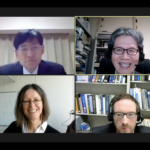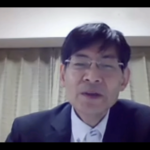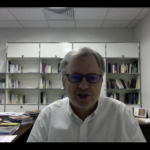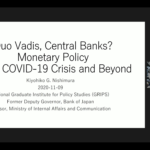
Download
Venue
You can watch a video of the complete web-forum on our DIJ YouTube channel here.
Co-organizer
German Centre for Research and Innovation (DWIH) Tokyo

Registration Info
We are sorry! Registration for this event is no longer possible.
Please subscribe to our DIJ Newsletter to stay informed about our research activities, events, and publications:
DIJ DWIH Web-Forum
Quo Vadis, Central Banks? Monetary Policy in the COVID-19 Crisis and Beyond
November 9, 2020
Now online on our YouTube channel.
Kiyohiko G. Nishimura, former Bank of Japan Deputy Governor (2008-2013)
Powerpoint-Presentation (PDF)
Katrin Assenmacher, Head of the Monetary Policy Strategy Division, ECB
Powerpoint-Presentation (PDF)
Moderated by Kazuo Momma, Executive Economist, Mizuho Research Institute
Central bank laws in the US, Japan and Europe consider price stability as the prime goal of monetary policy. However, since the Global Financial Crisis and even more so during the present COVID-19 crisis, we have observed the implementation of unconventional monetary policy measures accompanied by an unprecedented concerted action between monetary and fiscal authorities. Are these changes only temporary or do they indicate a fundamental change in the role of central banks, their relationship with governments and the constitution of monetary policy? How does the “new normal” affect the independence of central banks, which used to be considered a fundamental element in the design of central banking? What do these changes imply for the ability of central banks to commit to the goal of price stability? The discussion in this web-forum – moderated by Kazuo Momma – tackled questions regarding monetary policy in the COVID-19 crisis and its implications for current and future central banking, including concerns about climate change and inequality.
Introducing the speakers and moderators
Kiyohiko G. Nishimura is Emeritus Professor of Economics at The University of Tokyo and senior professor in the National Graduate Institute for Policy Studies (GRIPS). He received his B.A. (1975) and M.A. (1977) from The University of Tokyo and his Ph.D. (1982) from Yale University. He was an Arthur M. Okun Research Fellow (1981–1982) at the Brookings Institution in Washington, D.C., before joining the Faculty of Economics at The University of Tokyo in 1993, where he was Associate Professor (1983–1994) and Professor (1994–2005). He was appointed as an executive research fellow of the Economic and Social Research Institute of the Cabinet Office of the Government of Japan between 2003 and 2005, before joining the Bank of Japan as a Member of its Policy Board (2005–2008), and then as deputy governor (2008–2013). After returning to academia, he was dean of the Graduate School of Economics and chairman of the Faculty of Economics at The University of Tokyo (2013–2015). He was chairman of the Statistics Commission of Japan (2014-2019), and since October 2019, he has been Advisor of the Ministry of Internal Affairs and Communications.
Katrin Assenmacher has been Head of the Monetary Policy Strategy Division at the European Central Bank (ECB) since 2016. Before joining the ECB, she led the Monetary Policy Analysis unit at the Swiss National Bank (SNB). Katrin was a visiting scholar at the Federal Reserve Banks of St. Louis and Atlanta, the Oesterreichische Nationalbank and the Universities of Copenhagen and Southern California. She published several articles in international academic journals in the areas of monetary policy as well as time-series econometrics. She holds a Doctorate in Economics from the University of Bonn, where she also received her Habilitation. During her tenure at the SNB, she lectured courses on monetary policy and macroeconomics at the Universities of Zurich and Bern and served as a member of the Czech National Bank’s Research Advisory Committee.
Kazuo Momma is an Executive Economist of the Mizuho Research Institute. He had a long career at the Bank of Japan, including positions as Assistant Governor, in charge of international affairs, Executive Director, in charge of monetary policy, Director General, Monetary Affairs Department and Director General, Research and Statistics Department. He received his B.A. in Economics (1981) from The University of Tokyo and his MBA (1988) from Wharton School, University of Pennsylvania.
Franz Waldenberger has been Director of the German Institute for Japanese Studies (DIJ) in Tokyo since 2014. He is on leave from Munich University where he holds a professorship for Japanese Economy. His research focuses on the Japanese Economy, Corporate Governance and International Management. He is editor in chief of the international peer reviewed journal Contemporary Japan. His recent publications include Governance, Risk and Financial Impact of Mega Disasters. Lessons from Japan, Springer 2019 (co-edited with A. Kamesaka).
Markus Heckel has been a Senior Research Fellow at the German Institute for Japanese Studies (DIJ) since 2018. From 2012 to 2018, he worked at the Faculty of Economics, Goethe University Frankfurt.




